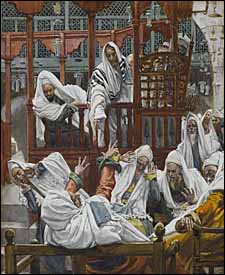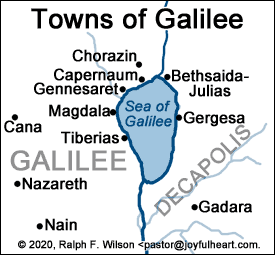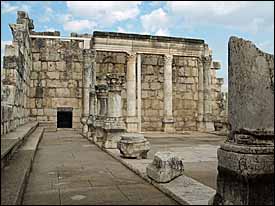
|
Old Testament
New Testament
Gospels
Acts
Paul's Letters
General Letters
Revelation
Topical Studies
Beginning the Journey (for new Christians). en Español

|
Old Testament
New Testament
Gospels
Acts
Paul's Letters
General Letters
Revelation
Topical Studies

|
Home
Bible Studies
Articles
Books
Podcasts
Search
Menu
Donate
About Us
Contact Us
FAQ
Sitemap
8. Confronting Demons at Capernaum (Luke 4:31-37, 41)
 James J. Tissot, 'The Possessed Man in the Synagogue' (1886-94), gouache on gray wove paper, 8.16 x 6.57 in., Brooklyn Museum, New York. |
"31 Then
he went down to Capernaum, a town in Galilee, and on the Sabbath began to teach
the people. 32 They were amazed at his teaching, because his
message had authority. 33 In the synagogue there was a man
possessed by a demon, an evil spirit. He cried out at the top of his voice, 34
'Ha! What do you want with us, Jesus of Nazareth? Have you come to
destroy us? I know who you are -- the Holy One of God!' 35 'Be
quiet!' Jesus said sternly. 'Come out of him!' Then the demon
threw the man down before them all and came out without injuring him. 36 All
the people were amazed and said to each other, 'What is this teaching? With
authority and power he gives orders to evil spirits and they come out!' 37 And the news about him spread throughout the
surrounding area....
41 Moreover, demons came out of many people,
shouting, 'You are the Son of God!' But he rebuked them and would not
allow them to speak, because they knew he was the Christ. (Luke 4:31-37, 41)
In church, of all places (actually in the synagogue at Capernaum), a demon-oppressed man starts yelling. Jesus is teaching, and suddenly is interrupted by the clamor. Now, I'm pretty sure that the synagogue leaders wouldn't have admitted the man to the meeting, if they had recognized him as demon-oppressed. But there he is anyway, a closet-demoniac. As Jesus is speaking, the demon that influences the man is aroused and seems to take over. The demon is spiritually sensitive; you have to grant it that. It senses the holy, divine, powerful presence of Jesus, even if the humans there don't yet understand. And the holy, powerful presence of Jesus arouses in it intense fear -- fear that Jesus will destroy its ability to influence the man. And so the demon challenges Jesus openly through the voice of the man it has oppressed.
"Ha! What do you want with us, Jesus of Nazareth," the voice snarls. "Have you come to destroy us? I know who you are -- the Holy One of God!"
"Be quiet," demands Jesus sharply. Then he commands the demon, "Come out of him!"
The man is thrown to the floor, convulses, and then is quiet. The demon is gone.
At the rear of the building you can see a man leading his wife and children out the door, muttering. "We'll never come back to this holy-roller synagogue again. How distressing!" Each Sabbath thereafter, the man takes his family to the synagogue at Nazareth that Jesus will never enter again. It's quieter there, and no spiritual warfare rages these days.
I couldn't resist this last paragraph. It is a joke, friends! But dealing with demons IS messy business. Jesus' presence has a way of bringing out the best in men and women -- and the worst. There is no spiritual neutrality as one of his disciples. If we dare to operate in God's power, there'll be some power confrontations that aren't too pretty.
We need to look carefully at the text to understand what's going on. So let's start at the beginning.
The passage we're studying examines Jesus' ministry to cast out demons. Please read in conjunction with this lesson my essay entitled "Demonization and Deliverance in Jesus' Ministry" in the Appendix.
Relocating to Capernaum (Luke 4:31)
 Towns of Galilee (larger map) |
After escaping martyrdom in Nazareth, Jesus returns to Capernaum, literally goes "down." Nazareth is perched in a hollow in a hilly area southwest of the Sea of Galilee at an elevation of 1,300 feet above sea level. Capernaum is a town near the water's edge at the north end of the lake at an elevation of 686 feet below sea level. Nazareth had been Jesus' hometown, now he moves to Capernaum and makes it his new base of operations. In Matthew 9:1 it is referred to as "his own town (polis)."
The word translated "town" (NIV) or "city" in the Matthew passage and here in Luke 4:31 is Greek polis, from which "acropolis," as well as our English words "politics" and "metropolis" are derived. Its original meaning in classical Greek is "close to that of 'town,' the oldest term for a fortified settlement or a larger settlement in general."77 But it came to refer to the ideal of the small self-governing Greek city-state. In the New Testament, however, the word doesn't carry these political connotations. It means simply "an enclosed place of human habitation as distinct from uninhabited areas, pastures, villages, and single houses."78 Capernaum was relatively small compared to larger cities of the lake. Even at its largest population during the Byzantine period, it comprised only about 1,500 people.79
The Capernaum Synagogue
 Remains of the 4th-century AD synagogue. |
When Jesus "began to teach the people" in Capernaum, it was apparently in the town's synagogue. Jesus' ministry of teaching out-of-doors hadn't become necessary yet for two reasons:
- He wasn't yet being mobbed by crowds of people that made preaching indoors impossible, and
- He hadn't yet stirred up enough opposition to be banned from synagogues.
As yet, he was hardly a blip on the religious establishment's radar, and Capernaum is far from the powers that be in Jerusalem.
If you visit the site of Capernaum today, you'll see the ruins of a rather elegant white synagogue built in the late fourth century AD. The synagogue in which Jesus taught is no longer standing. But excavations in trenches under the central nave of the prayer hall in the white synagogue, beginning in 1969, exposed the stone pavement of the first century synagogue built by the Roman centurion (Luke 7:5) and visited by Jesus.80
Teaching with Authority (Luke 4:31-32)
When Jesus did begin to teach in the synagogue, however, he startled people: "They were amazed at his teaching, because his message had authority" (4:32). They were used to commentary on Scripture and on other commentators in the scribal tradition. Matthew 7:29 and Mark 1:22 add the phrase "... not as the scribes." If you've ever read the Rabbinical writings of early Judaism, you understand the style: wise comments that add to what a former Rabbi has said, most of it meaningless minutiae. But when Jesus taught, he taught authoritatively, with the Spirit upon him. He spoke more like a prophet than a scribe, with a "Thus saith the Lord..." rather than "thus spoke Rabbi So-and-So." It was compelling preaching. By contrast with anything else the people had heard, it was shocking. Luke uses the Greek word ekplessō, "be amazed, overwhelmed"81 in the imperfect tense, so it carries the idea of continued action: "they were continually amazed...."
Demonic Spirits Recognize Jesus (Luke 4:33-34, 41a)
While Jesus is teaching, the demonic spirit in a man present in the synagogue yells out. The man can't contain it.
"Ha! What do you want with us, Jesus of Nazareth? Have you come to destroy us? I know who you are -- the Holy One of God!" (4:33-34)
The demon in the man has more spiritual discernment than many. As a spirit himself, the demon recognizes the powerful presence of another Spirit. But this Spirit is holy. Not passively Holy, but actively Holy, speaking truth through the Anointed Son of God that is starting to set free a whole synagogue assembly room of people. The power is overwhelming to the demon, and so he yells out. We see this phenomenon at Peter's door that same evening. People are bringing all their sick for healing, but in the crowd are demonized people, too. And they are shouting, "You are the Son of God!" (4:41)
Jesus Shuts Up the Demons (Luke 4:35a, 41b)
At first glance you wonder why Jesus stops the demons from speaking. After all, they are speaking the truth. Jesus is indeed the Son of God, the Holy One of God. The demons are declaring openly what the residents of Capernaum may only be suspecting vaguely. Why does Jesus stop the demons? At least five reasons are involved:
- Distraction. The demons are creating a scene, interrupting, and drawing attention away from Jesus' teaching. They are subverting his purpose and ministry. If they can turn people's minds from truth to the spectacular, they can prevent truth from working change and freedom.
- Defrauding. The demons are stealing something that does not belong to them -- the voices of human victims they have gained control over. To let them continue to speak through their victims is to give tacit approval to their rape of the victim's faculties.
- Deception. Before long, truth will be mingled with half-truths. When demons speak, you don't get pure truth. It may sound like truth, like it did to Eve in the Garden of Eden, but soon there is the subtle twist, the doubt, the hook. Jesus doesn't trust the speakers and so he commands them to be silent.
- Derailment. It is not time to declare Jesus' Divinity and Messiahship. Specifically, Jesus prohibits demons from speaking "because they knew that he was the Christ" (4:41b, i.e. the Messiah. See Mark 3:11-12). The term "Messiah" has strong political connotations in first century Palestine. To proclaim Jesus as Messiah prematurely would keep people from hearing Jesus' essential teaching. You'll notice, especially in Mark's Gospel, that Jesus prohibits some of the people he heals from disclosing it, because to do so would cause Jesus to be mobbed in every village he comes to (Mark 1:45). Notice, also, that Jesus seldom speaks of himself as "Son of God," but as "Son of Man." Using the term "Son of God" would cause him to be accused of blasphemy and sidetrack his ministry (John 10:33; 19:7). The demons at Capernaum are wittingly or unwittingly involved in subverting Jesus' own timetable for his ministry and self-disclosure.
- Discrediting. The endorsement by obviously troubled and demonically-controlled people can hardly enhance Jesus' reputation. It is kind of like a conservative Republican presidential candidate being officially endorsed by the Communist Worker's Party. Demonic endorsement is the last kind of endorsement Jesus needs!
Jesus Casts Out the Demons (Luke 4:35b, 41a)
There are doubtless many demons in people around Jesus that don't betray their presence. Just as there are many sick people in Palestine who don't come seeking healing from Jesus. But so long as demons don't manifest their control of the demonized person, Jesus doesn't usually confront them. After all, there are thousands of people actively seeking healing and freedom; why focus on those who aren't yet sure they want freedom? But when the demons manifest themselves, Jesus makes short work of them. He commands them to come out. Certainly, the crowds in Capernaum are impressed: "What is this teaching?" they ask. It is spoken with the authority of someone who knows it to be true, one who commands evil spirits and must be obeyed.
And Jesus' command cannot be resisted, so great is his spiritual authority. We'll observe this in exorcisms later in Luke, and consider our own ministry responsibility in this area. But for now, we need to observe that Jesus proactively meets demonic interruption and stops it by breaking the spiritual bonds that the demons use to control their victims. Jesus sets people free.
 Lessons compiled in 805-page book in paperback, Kindle, & PDF. |
Jesus' teaching ministry of truth is an open declaration of war upon the Deceiver. Jesus' first salvo of truth is met by a salvo of confusion. This, in turn, is answered by a word of command. In the war of good verse evil, of truth verse darkness, Jesus is equipped to win. And with the intent of victory, he equips his disciples, as well.
Prayer
Lord Jesus, I see your ministry and I am in awe. So often when I meet outright evil, I retreat in fear and impotence. Teach me as your disciple to minister your truth in power. To see the demonic chains drop off the people I minister to. Nothing less is adequate to the day in which I live. Thank you, Jesus, for empowering me, and my brothers and sisters with me, to preach good news to the poor and set the captives free. In your powerful name, I pray. Amen!
Key Verse
"They were amazed at his teaching, because his message had authority." (Luke 4:32)
Questions
Click on the link below to discuss on the forum one or more of the questions
that follow -- your choice.
https://www.joyfulheart.com/forums/topic/1923-8-demons/
- What is the relationship between Jesus' commission in Luke 4:18-19 and his ministry acts in Capernaum?
- Jesus' words were spoken with conviction and authority, compared to the scribes who often spoke in the synagogue. What was the source of Jesus' conviction and authority? His divinity? Or something else? Should we expect conviction and authority to attend our own teaching? Why or why not?
- Why do you think the demon oppressed man interrupted Jesus?
- After you've read Dr. Wilson's essay on "Demonization and Deliverance in Jesus' Ministry" (in Appendix 2, do you think he proves his assertion that demonization describes a range of demon influence, rather than complete possession? Why or why not?
- Why isn't recovery from demonic deception always instantaneous? What is the process of deliverance that a person must go through to come to full freedom?
- Give examples from your own life or experience on how deceptive and innocent involvement in sin can appear, and how terrible the consequences.
- What will happen in your life if you toy with or nurture the temptations you have to sin? What happens when sin and Satan get a foothold in your life?
Endnotes
[77] Hermann Strathmann, polis, ktl. TDNT 6:516-535. Cites here on p. 516, Busolt, p. 153.
[78] Ibid., p. 530. There is no sharp distinction between polis and the word for small town, village (komē). Sometimes towns that are termed polis in one Gospel are called komē in another.
[79] Stanislao Loffreda, Recovering Capharnaum (Second Edition; Studium Biblicum Fransciscanum Guides I; Jerusalem, Franciscan Printing Press, 1993, reprinted 1997), p. 18.
[80] Ibid., p. 43-45.
[81] Ekplessō, BAGD 244.
Copyright © 2026, Ralph F. Wilson. <pastor![]() joyfulheart.com> All rights reserved. A single copy of this article is free. Do not put this on a website. See legal, copyright, and reprint information.
joyfulheart.com> All rights reserved. A single copy of this article is free. Do not put this on a website. See legal, copyright, and reprint information.


 To be notified about future articles, stories, and Bible studies, why don't you subscribe to our free newsletter, The Joyful Heart, by placing your e-mail address in the box below. We respect your
To be notified about future articles, stories, and Bible studies, why don't you subscribe to our free newsletter, The Joyful Heart, by placing your e-mail address in the box below. We respect your